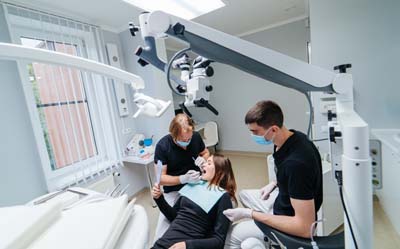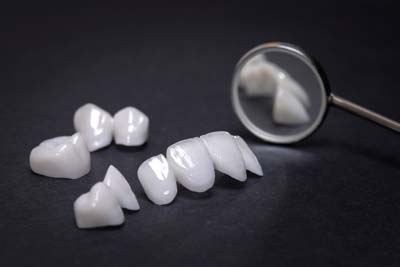What You Need to Know About Dental Extractions
 Dental extractions, the removal of one or more teeth from the alveolar bone, are far more feared than most other dental treatments like fillings or veneers. Most people simply dread the prospect of having a tooth pulled. However, knowing exactly what to expect during the process may help to relieve anxiety, while knowing what to do afterward will help speed up your recovery.
Dental extractions, the removal of one or more teeth from the alveolar bone, are far more feared than most other dental treatments like fillings or veneers. Most people simply dread the prospect of having a tooth pulled. However, knowing exactly what to expect during the process may help to relieve anxiety, while knowing what to do afterward will help speed up your recovery.
But first, why does a tooth have to be removed?
Why Dental Extractions Become Necessary
Although permanent teeth are designed to last a lifetime, there are a number of reasons why a tooth may need to be extracted. For example:
- Severe Damage: If one or more of your teeth have been damaged or decayed to the point that repair is simply not possible.
- Periodontal or Gum Disease. Periodontal disease is an infection of the tissues and bones that surround and support the teeth. Should this have advanced to a point where the diseased gum has caused one or more teeth to become loose, it may become necessary to remove the teeth
- Extra Teeth: Occasionally, some people have extra teeth in their mouth, which are very likely to keep regular teeth from erupting or cause problems with the bite.
- Impacted Teeth: An impacted tooth is one that, for one reason or another, has either failed to erupt or has emerged only partially. This is a problem common to one’s wisdom teeth, especially when there is insufficient room in the back of the jaw. While not all impacted teeth cause discomfort, sometimes swelling, pain, and infection of the gum tissue can result.
- Orthodontic Treatment: Misaligned or crooked teeth can be straightened with braces. However, on occasion, the teeth are crowded, and space has to be made in the jaw so the remaining teeth can be aligned properly.
What to Expect During a Dental Extraction
Most tooth extractions are a relatively simple procedure performed under a local anesthetic, which has to be injected into the gum. While there is some discomfort associated with the injection, a numbing agent is usually applied to the surface of the gum, so you do not feel much of the prick of the needle. If you are very nervous, additional local anesthetic can be preceded by oral medication that keeps you calm or nitrous oxide that causes you to feel slightly euphoric. Both are highly effective ways to alleviate mild to moderate anxiety.
As the medication begins to take effect in about three to five minutes, you may notice your tongue, cheek, and/or lip have lost feeling. If you have been in pain with a decayed or traumatized tooth, you will feel blessed relief at this stage. After the area is completely numb, the tooth can be extracted.
Most people are under the impression that their teeth are set in the bone like a pole is set in concrete. This is far from the case. The tooth is attached to the alveolar bone by connective fibers called the periodontal ligaments. The tooth has to be rocked back and forth to loosen it from the bone and detach the ligaments that hold it in place, a motion you may feel.
Feeling and Sound
Because local anesthetic only works on nerve fibers, you will feel both pressure and movement while the tooth is being removed. However, under normal circumstances, there will be no pain. And in case you do begin to feel some, you can always signal you would like a little more pain medication.
Also, you may hear a snapping or breaking noise, which is nothing to worry about, being usually caused by one of the roots of the tooth breaking. This is a minor issue, and the remaining part of the root will be removed separately.
In most cases, dental extractions take between five and 15 minutes. You will be asked to bite down on a piece of gauze until the bleeding stops and may be prescribed an antibiotic to discourage any infection.
We will also discuss what you should and should not eat and drink until the wound is completely healed.
Recent Posts
Tooth extraction can be frightening, but it is often necessary in order to keep a healthy mouth. There are a few important things to note about what comes after a tooth extraction, whether it be recovery or replacing the extracted tooth. In this article, we go over tooth extractions and what comes afterward. If you have…
While permanent teeth have the potential to last a lifetime, decay or damage can create the need to extract some of the teeth. In other instances, the mouth is crowded and extracting teeth will help to prepare a patient's mouth for orthodontics that properly aligns the teeth.Tooth extraction can also occur as a result of infection…
Tooth extractions are sometimes necessary and a tooth sustains damage that hinders the functionality of the tooth. While it is true that adult teeth are designed to be permanent, there are a number of conditions that can lead to the need for tooth extractions. These include: Severe damage An intense infection Overcrowding Disease Not enough…
Dental extractions, also known as tooth extractions, are performed when teeth that are causing pain or infection need to be removed from the bone and socket. Many people need dental extractions without even knowing how serious the condition of their teeth is. If you are unsure how to know if you need dental extractions, we…


